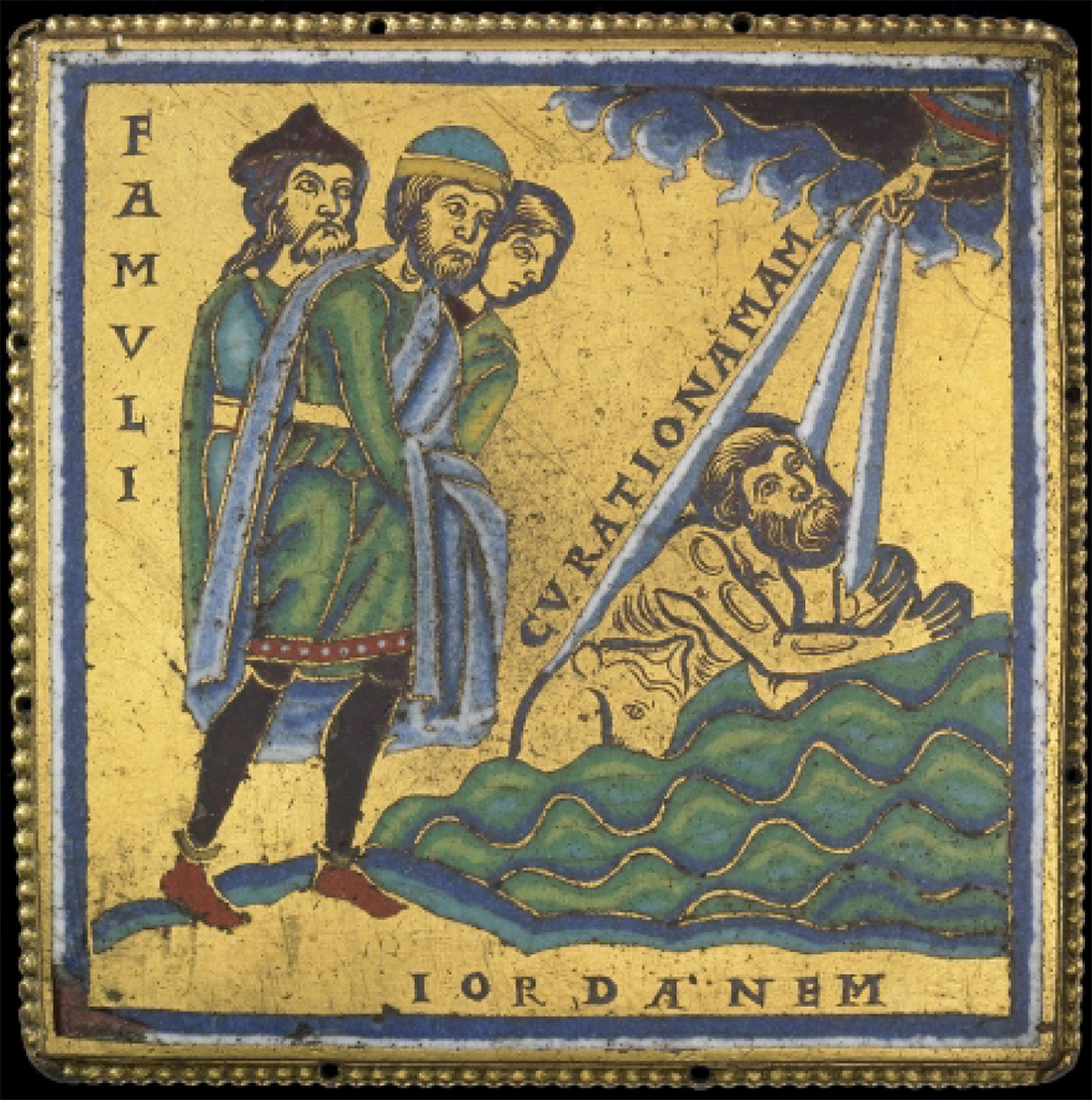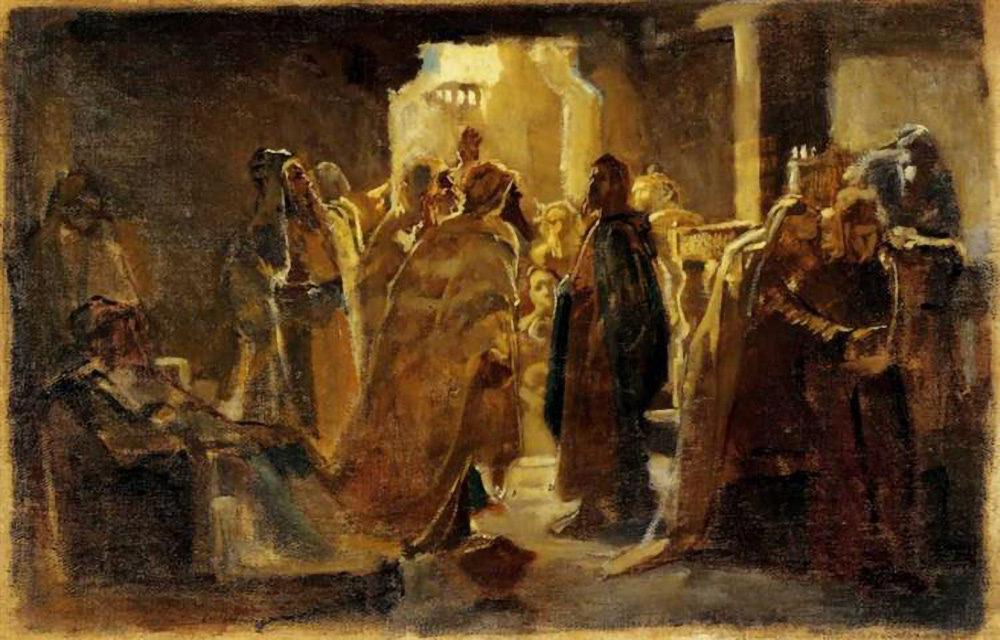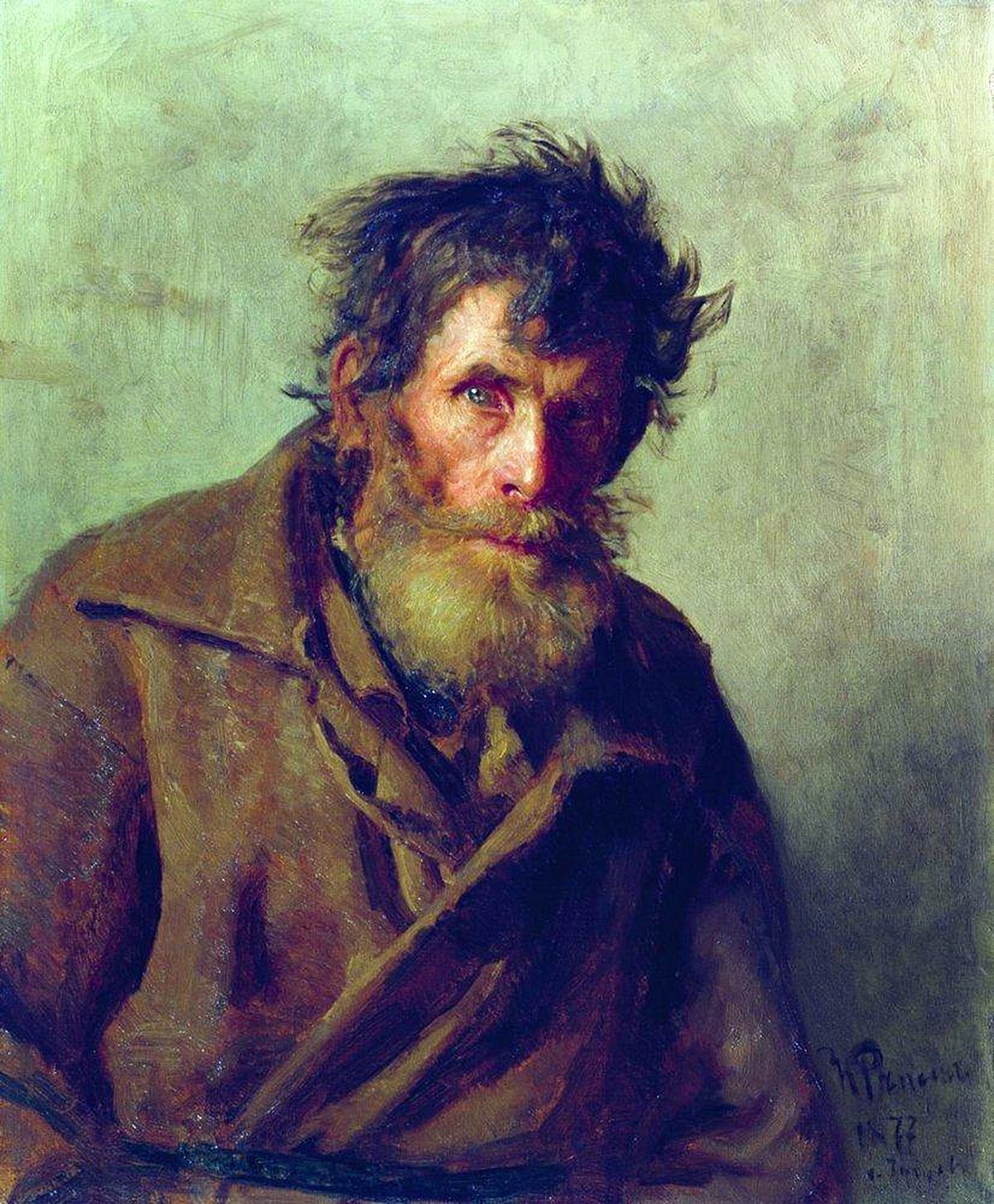Monday of the Third Week of Lent: 2 Kings 5:1-15ab, Luke 4:24-30.
You’ve likely heard the adage that God works in mysterious ways. Today’s readings put a finer point on this: God ways are mysterious because they paradoxically appear to be common. Another way to say this is that God uses the things and people we know (or think we know) to enact His will in the world. This is unexpected because we expect something more flashy, more glorious. Oddly, we see people in both the Old and New Testaments reacting with anger when they are faced with this unexpectedly common appearance of divine will in the world. Isn’t that a bit odd? To get angry? I’d like to explore the significance of this instance of God’s plan and our reactions to it.

Pietro Perugino | Wikimedia Commons.
I particularly like the reading from the second Book of Kings because it reveals that our God is truly a God of all Creation, blessing people other than the Israelites. We might get a skewed conception of God given our scriptural lens into God’s actions with His Chosen People. Yes, the story of humanity’s salvation lies in the Jewish people and then Christianity, but we can never allow our understanding to delimit God in any way. Jesus tells us that no one knows the Father except the Son, and many Doctors and Saints have affirmed that God is unknowable. St. John of Damascus puts it well: “God is infinite and incomprehensible and all that is comprehensible about Him is His infinity and incomprehensibility” (On the Orthodox Faith). In my mind, it’s a good little jolt of remembering not to limit God when we read that He “had brought victory to Aram” through the military commander Naaman. His reach is limitless, His love is limitless, and those outside of the Jewish nation have undoubtedly played a big role in revealing God to all the nations (as Jesus points out in the gospel reading).
After hearing how the holder of secular power, the king of Israel, is sent into a paranoid fit at the appearance of Naaman from his powerful neighbors, Naaman finds his way to the true spiritual power of the Chosen People in the prophet Elisha. Here is the crux of the meeting: “Naaman came with his horses and chariots and stopped at the door of Elisha’s house. The prophet sent him the message: ‘Go and wash seven times in the Jordan, and your flesh will heal, and you will be clean.'” Note the scene: a big entourage of military might arrives at the prophet’s house and Elisha doesn’t even come outside to greet them. Elisha “sent him the message,” likely via a servant, and the message is almost offhand: “go dunk in the local river Jordan.” We can start to understand why Naaman got angry. It’s a problem of appearances. Naaman feels disrespected because Elisha doesn’t even appear before him. There is no ceremony, no waving of hands and calling out loudly to the Lord for healing. And the river Jordan isn’t a crystal clear mountain spring or even very big and mighty. All “signs” point to disappointment. Naaman typifies the angry disappointment of humanity facing the lack of a flashy and mighty God-on-earth.
God is asking Naaman to accept Him in humility. This is always an important step in our encounter with God. We are asked to put away our way of knowing in favor of His way of knowing. Humility (and humiliation) are our path to putting aside our own preconceptions and stubborn “knowledge” of how things work.
Thus, God acts again through humble messengers: Naaman’s servants. They plead with the great military commander to do what was asked. Their logic is interesting: you would have done something much more difficult if the prophet had asked it of you, so why not do the easier task? This reasoning resonates with him; he goes to the Jordan under the logic of a servant, finally ready to do what is asked of him. This is the baptismal sign under which God consecrates us to Him, the same sign He gives to Noah and the earth and the same by which John the Baptist prepares us for Christ. For Naaman, “His flesh became again like the flesh of a little child, and he was clean.” We can thus understand his leprosy as a sign of his pride and reliance on his own powers of knowing rather than being open to God’s way of knowing. Once he humbles himself and does what he is asked, he is clean. The child-like condition of his skin mirrors the child-like openness of his soul, something Jesus asks of us: “Truly I tell you, unless you change and become like children, you will never enter the kingdom of heaven” (Mt 18:3).

The final piece of the account is that Naaman returns to Elisha’s house and praises God, not the prophet. He has been truly converted to God, he has understood his humble relationship to the Creator and rightly praises Him: “Now I know that there is no God in all the earth, except in Israel.” He has changed his entire understanding of this journey — it wasn’t a journey to meet with a prophet and be cured by a human with powers; it was a journey to encounter God Himself, who works through the common fabric of humanity that He loves.
Like Naaman, the Nazarenes in the gospel reading are asked to accept the words of a prophet delivered in an unexpectedly common way. This scene from the Gospel of St. Luke occurs at the very beginning of Jesus’s ministry after He returns from his 40 days in the desert. He comes to his hometown of Nazareth and reads a famous passage from Isaiah in the synagogue: “The Spirit of the Lord is upon me, because he has anointed me to bring good news to the poor …” (Is 61:1). This is the message of deliverance in the Book of Isaiah. Jesus then proceeds to proclaim, “Today this scripture has been fulfilled in your hearing.” Shock of shocks! This son of Joseph, whom they all know since childhood, is claiming to be the Anointed One of God, ushering in a new era for the nation of Israel! They are incredulous; after all, they know him, he is common, and surely the Messiah won’t be the son of a common carpenter, much less that Jesus we’ve seen so many times we forget he’s even around.
In response, Jesus begins, “Doubtless you will quote to me this proverb, ‘Doctor, cure yourself!’ And you will say, ‘Do here also in your hometown the things that we have heard you did at Capernaum’ (Lk 4:23). The proverb comes from a place of disbelief and contains an implicit “prove it to me first before I believe you” (that is, show that you’re in top shape before trying to heal me). Jesus knows that they want to test Him, make Him prove Himself as the Messiah by working miracles in their midst. His answer is the same one that Naaman receives. The prophet won’t be made to perform or do circus tricks for the demanding audience. That’s not how God’s will is accomplished. He works through common, humble humanity — nothing proves this more than this moment when the Son of God acknowledges that He is also just a son of a humble carpenter named Joseph and this does not diminish in any way the power, glory, and majesty of His being the Messiah.
Jesus sums up His poor reception among His childhood neighbors thus: “Amen, I say to you, no prophet is accepted in his own native place.” Human expectations of the miraculous and divine are too concerned with style and not concerned enough with substance. We, like Naaman and the Nazarenes, want something special, electric, and obvious to appear and wow us. Once we’ve made up our minds about people we know, we cross them off the list of potential sources of God at work in the world. We think of this as wise, worldly and mature, but God again and again tries to show us that the Spirit works through any and all according to God’s will — we can’t predict it with our intelligence, much less categorize things as likely or unlikely based on how well we know someone. This why Jesus’s words to “change and become like children” are so important. Children don’t carry the burden of preconceptions fossilized into place after years of experience. They are open to be amazed at the things around them, open to the wonder inherent in their parents, siblings, and friends. This is also why death to self and rebirth in the Spirit is such an important concept in the sacrament of Baptism.

Jesus goes on to give us another level of significance to Naaman and Elisha in the gospel reading. On one hand, the Nazoreans are just like Naaman in their expectations that the prophet will be flashy and commensurate with their expectations of grandeur. But on the other hand, Jesus points out that in the scope of salvation history they are the opposite of Naaman because they are the Jews, stubborn and unconverted in heart, while he is the Gentile outsider who displays a true conversion. Jesus sharpens the point of the Gentile miracles found in the scriptures. He says that this is not coincidence but instead God’s plan because human nature is what it is: “there were many lepers in Israel during the time of Elisha the prophet; yet not one of them was cleansed, but only Naaman the Syrian.” Jesus is saying that these Gentiles were chosen by God, like the Jewish prophets were chosen by God, and together they reveal the greatness of the Lord.
The Jews take this as a great insult: “When the people in the synagogue heard this, they were all filled with fury.” Luke reminds us that this exchange takes place in the synagogue — the place where the Chosen People set themselves apart in their worship of their God. The weight of thousands of years of Jewish exceptionalism is felt in this moment. They were the Chosen People, special to God, with whom He makes His Covenant. They have crafted for themselves an identity in a hostile world that hinges upon their special relationship with God and here is a common man telling them — in their holy synagogue — that unlikely people and outsiders are in fact chosen by God over them, His People. It’s an outrage to them.
They have missed Christ’s lesson. They could have reasonably reflected upon His words and allowed humility to enter their hearts like Naaman did at the prompting of his servants. Instead, in their rage, they drive him to the outskirts of town with the intention of killing him. This is no conversion-to-God scene. Worse than missing His lesson or the opportunity to humble themselves before God, they have missed recognizing the Messiah in their midst. They are proving Jesus’s words to be true, that “no prophet is accepted in his own native place.” And in a sentence illustrating the massive significance of how they missed knowing Him, “he passed through the midst of them and went away.” They miss recognizing Jesus, His lessons, and His new era of living in the light so profoundly that He can just pass through the midst of them. They are literally blind, groping angrily in spiritual darkness, unable to even remember who it was who they are angry with, why they are angry, or what they are doing with themselves there at the edge. (I reflected on a different aspect of this moment last year, considering the Spirit-like movement of Christ out of their midst. Read that reflection in A Prophet in his Own Land.)
In Lent, we are called to prayer, fasting, and acts of charity (i.e., caritas or agape love). As we turn our attention to the vulnerable, the poor, and the needy, we should find ourselves reaching out to help them in some form or another. We are taught that we participate in God’s love when we act in charity and love, but let’s consider the mindset with which we approach our acts of charity and how that might impact whether we truly participate in God’s love. If we do good deeds with an eye on reaping eternal rewards, then this is self-serving. If we do good deeds simply because we are convinced it is morally right, without encountering God in the other, then we are spiritually frozen. If we do good deeds in an honest way but harbor a hidden feeling of the uncleanliness or lowliness of those we are serving, we are missing Christ in the same way the Nazarenes did. We have to become like children, ready to be filled with wonder as we notice God everywhere in creation. We cannot harbor a feeling of superiority, even if we push it down and don’t let it show. We have to humble ourselves before God, embrace our baptism and rebirth, and see that common, unexpected person as likely even more chosen than we are.
